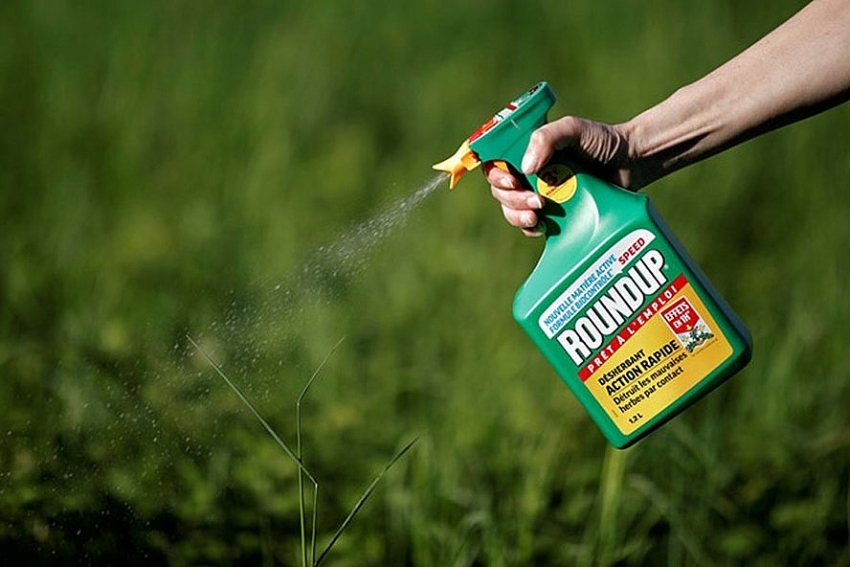Half the crops in would be lost without pesticides
 |
| Glyphosate, which is one of the most popular pesticides. Sourse: Laodong.vn |
This was suggested by experts at the workshop evaluating the situation and challenges in management and use of pesticides in Vietnam organised by the General Council of Agriculture and Rural Development on August 28.
According to information published at the workshop, more people in Vietnam and the globe have access to quality food than ever before because of the improved technology and agricultural practices adopted by farmers.
This would not have been possible without crop protection tools such as pesticides, without which more than half of the world’s crops would be lost to insects, diseases, and weeds. Meanwhile, the expenses to develop the organic agricultural sector are 20 times higher than those on pesticides.
In Vietnam, a large number of farmers still abuse pesticides, either going beyond the recommended volume or using the chemicals for the wrong purpose. The level of awareness and social responsibility of the users of pesticides in Vietnam is limited, causing numerous undesirable impacts on public health and the environment in recent times.
However, experts said that an arbitrary ban would impact local farmers and importers of pesticides, signifying that the government does not encourage agricultural innovation, which would be an alarming precedent that could impact Vietnam’s ability to attract future investment and undermine the government’s national development objectives.
Based on this, the representative of CropLife Vietnam offered solutions to effectively use pesticides. Accordingly, in parallel with the tightening of the management methods to select a product which is safe and suits the cultivation conditions of Vietnam, implementing training courses for farmers to use the products is considered the most sustainable solution.
Bui Van Kip, technical director of Bayer Vietnam Ltd., stated that in order to popularise safe and effective pesticides to famers, Bayer Vietnam focuses on implementing both sales and training programmes for farmers. Accordingly, Bayer Vietnam will try to make farmers understand that despite the price of safe and effective pesticides being higher than low-quality products, their effect is also much higher. This way, both enterprises and farmers will benefit.
In the framework of the workshop, experts also discussed glyphosate products, which have been used in 160 countries, including Vietnam, during the past 40 years.
This product is considered one of the safest pesticides if it is used at the recommended dosage. The overwhelming consensus among scientific reviews by national and international regulatory bodies and scientific organisations is that glyphosate poses no unreasonable risk to people, wildlife or the environment when used following label directions. In the past three years alone regulatory authorities in the European Union, Germany, South Korea, Japan, Australia, New Zealand, Canada, and the US have publicly reaffirmed that glyphosate does not cause cancer.
A potential ban on glyphosate would increase farmers’ weed control costs by at least 10 per cent in essential crops to Vietnam, including rice, corn, coffee, rubber, tea, sugar cane, and tropical fruit. Besides, removing weeds by hand is an enormous undertaking requiring hundreds of hours of hard labour digging with metal hoes or bending over to pull weeds.
Every day spent hand weeding can lead to delays in planting and rob farmers of potential yield and put their harvest and health at risk. Time previously spent removing weeds can be used to create opportunities for smallholders, particularly women and children in rural, developing countries. In rural Africa for example, at peak season, many children are needed to help pull weeds on their family farms. On average, smallholder farmers using modern crop protection technologies generally send their children to school more often.
The environment will also be directly impacted as farmers lose the benefits of conservation tillage practices—a breakthrough brought about by glyphosate. Banning glyphosate will lead to changed farm practices that could lead to increased soil erosion, lower water retention, and higher carbon emissions. Farmers would also be forced to increase the use of other, less effective pesticides.
What the stars mean:
★ Poor ★ ★ Promising ★★★ Good ★★★★ Very good ★★★★★ Exceptional
 Tag:
Tag:
Related Contents
Latest News
More News
- France supports Vietnam’s growing role in international arena: French Ambassador (January 25, 2026 | 10:11)
- Foreign leaders extend congratulations to Party General Secretary To Lam (January 25, 2026 | 10:01)
- Russian President congratulates Vietnamese Party leader during phone talks (January 25, 2026 | 09:58)
- Worldwide congratulations underscore confidence in Vietnam’s 14th Party Congress (January 23, 2026 | 09:02)
- Political parties, organisations, int’l friends send congratulations to 14th National Party Congress (January 22, 2026 | 09:33)
- 14th National Party Congress: Japanese media highlight Vietnam’s growth targets (January 21, 2026 | 09:46)
- 14th National Party Congress: Driving force for Vietnam to continue renewal, innovation, breakthroughs (January 21, 2026 | 09:42)
- Vietnam remains spiritual support for progressive forces: Colombian party leader (January 21, 2026 | 08:00)
- Int'l media provides large coverage of 14th National Party Congress's first working day (January 20, 2026 | 09:09)
- Vietnamese firms win top honours at ASEAN Digital Awards (January 16, 2026 | 16:45)

























 Mobile Version
Mobile Version